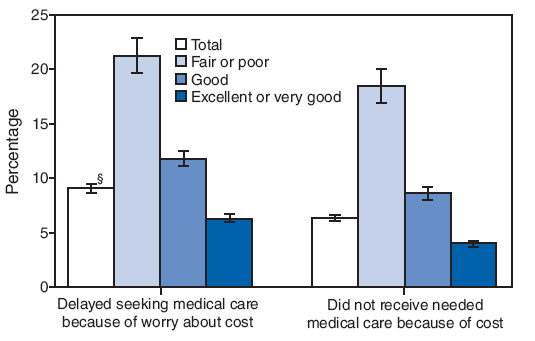Persons using assistive technology might not be able to fully access information in this file. For assistance, please send e-mail to: mmwrq@cdc.gov. Type 508 Accommodation and the title of the report in the subject line of e-mail.
QuickStats: Estimated Percentage of Persons Who Delayed Seeking or Did Not Receive Medical Care During the Preceding Year Because of Cost, by Respondent-Assessed Health Status* --- National Health Interview Survey, United States, 2008†

* Based on responses to the following questions: "During the past 12 months, has [person] delayed seeking medical care because of worry about the cost?" and "During the past 12 months was there any time when [person] needed medical care but did not get it because [person] could not afford it?" Both questions exclude dental care. Respondents were asked to answer regarding themselves and other family members living in the same household. Health status data were obtained by asking respondents to assess their own health and that of family members living in the same household as excellent, very good, good, fair, or poor.
† Estimates are age adjusted using the projected 2000 U.S. population as the standard population and using five age groups: 0--11 years, 12--17 years, 18--44 years, 45--64 years, and ≥65 years. Estimates are based on household interviews of a sample of the civilian, noninstitutionalized U.S. population.
§ 95% confidence interval.
In 2008, an estimated 9.1% of the U.S. population (27.4 million) delayed seeking medical care during the preceding year because of worry about the cost, and 6.4% (19.5 million) did not receive needed medical care because they could not afford it. Persons whose health was assessed as fair or poor were more than three times as likely as persons whose health was excellent or very good to delay seeking or not receive needed medical care because of cost. Persons in each health assessment group also were more likely to delay seeking medical care because of worry about the cost than to not receive needed medical care because of cost.
SOURCE: Provisional report: Adams PF, Heyman KM, Vickerie JL. Summary Health Statistics for the U.S. Population: National Health Interview Survey, 2008. National Center for Health Statistics. Vital Hlth Stat 10(243). 2009. Available at http://www.cdc.gov/nchs/data/series/sr_10/sr10_243.pdf.
Alternative Text: The figure above shows the estimated percentage of persons who delayed seeking, or did not receive medical care during the preceding year because of cost, by respondent-assessed health status in 2008. That year, an estimated 9.1% of the U.S. population (27.4 million) delayed seeking medical care during the preceding year because of worry about the cost, and 6.4% (19.5 million) did not receive needed medical care because they could not afford it. Persons whose health was assessed as fair or poor were more than three times as likely as persons whose health was excellent or very good to delay seeking or not receive needed medical care because of cost. Persons in each health assessment group also were more likely to delay seeking medical care because of worry about the cost than to not receive needed medical care because of cost.
Use of trade names and commercial sources is for identification only and does not imply endorsement by the U.S. Department of
Health and Human Services. |
All MMWR HTML versions of articles are electronic conversions from typeset documents. This conversion might result in character translation or format errors in the HTML version. Users are referred to the electronic PDF version (http://www.cdc.gov/mmwr) and/or the original MMWR paper copy for printable versions of official text, figures, and tables. An original paper copy of this issue can be obtained from the Superintendent of Documents, U.S. Government Printing Office (GPO), Washington, DC 20402-9371; telephone: (202) 512-1800. Contact GPO for current prices.
**Questions or messages regarding errors in formatting should be addressed to mmwrq@cdc.gov.Date last reviewed: 12/2/2009


